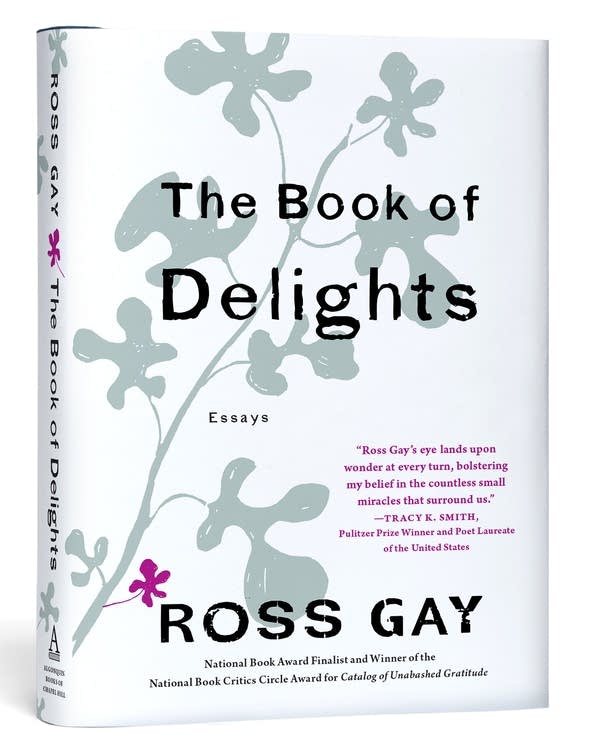If you have yet to read Ross Gay‘s The Book of Delights (2019), here is an invitation to pick it up. A collection of 102 brief essays he wrote over the course of a year, the book is about the possibility – the necessity – of attentiveness to joy in the world. We live in dark times, and the book does not ignore that. Gay’s sense of delight is capacious, including appreciating beauty, understanding fear, enjoying music, considering the insights gained from pain.

Let me give you an example – one I have shared with many friends, since first I read the book back in March.
The phrase “communities of sorrow” does not appear in Gay’s The Book of Delights. But the idea does. Gay writes:
Among the most beautiful things I’ve ever heard anyone say came from my student Bethany, talking about her pedagogical aspirations or ethos, how she wanted to be as a teacher, and what she wanted her classrooms to be: “What if we joined our wildernesses together?” Sit with that for a minute. That the body, the life, might carry a wilderness, an unexplored territory, that yours and mine might somewhere, somehow, meet. Might, even, join.
And what if the wilderness – perhaps the densest wild in there – thickets, bogs, swamps, uncrossable ravines and rivers (have I made the metaphor clear?) – is our sorrow? Or, to use [Zadie] Smith’s term, the “intolerable.” It astonishes me sometimes – no, often – how every person I get to know – everyone, regardless of everything, by which I mean everything – lives with some profound personal sorrow. Brother addicted. Mother murdered. Dad died in surgery. Rejected by their family. Cancer came back. Evicted. Fetus not okay. Everyone, regardless, always, of everything. Not to mention the existential sorrow we are all afflicted with, which is that we, and what we love, will soon be annihilated. Which sounds more dramatic than it might. Let me just say dead. In this, sorrow, of which our impending being no more might be the foundation, the great wilderness?
Is sorrow the true wild?
And if it is – and if we join them – your wild to mine – what’s that?
For joining, too, is a kind of annihilation.
What if we joined our sorrows, I’m saying.
I’m saying: What if that is joy?
I find myself drawn to this because I’ve come to really appreciate sadness. Sadness connects us to others. As Gay suggests, it binds all of us humans together because we all carry within us sadness and pain. It is an affective opening-up, and in this sense sadness is the opposite of depression. When I mentioned this idea to my therapist, he said that there are many flavors of depression, and that I was describing anhedonic depression. So, revise the previous sentence to say that anhedonic depression is an affective break with the world, an inability to feel. But sadness offers – or, at least, can offer – a deeper connection to the world, and to our fellow humans. On the Venn Diagram of emotions, sadness overlaps with love.
The previous paragraph is one of my delights. Since reading Gay’s book, I have been trying to be more attentive to delights. After mentioning this to Mark Newgarden in New York, in May, he asked was I writing these down? I was not. So, in June, I began keeping a kind of diary. I call it “Daily Delights,” even though I don’t write in it every day. Here are four more.
From 26 June, Manhattan, Kansas. Upon finishing my swim, I pulled myself out of the pool as another swimmer – who had just arrived – remarked to the swimmer in the adjacent lane that she knew she wouldn’t need to wait for a lane because I was predictable. Smiling, I said, “What do you mean? I warmed up the lane for you.” After a brief, good-natured conversation, I wished her a good swim, said that I was glad to be so predictable, and began to amble off to the showers. Worried that she may have insulted me, she walked a few steps with me to explain herself. I assured her that I understood and that I was indeed predictable.
Our conversation prompted this reflection. “Predictable” is one of those few words that renders a negative judgment both as itself and as its negation. To say that a person is “unpredictable” conveys the notion that he/she is unreliable, potentially volatile, emotionally unstable, or even unhinged. Though it should be complimentary, “predictable” – when applied to a person – generally means “boring.” If we want to compliment someone’s predictability, we instead say that she/he is reliable. Or, if we want to praise unpredictability, we may call a person surprising or, perhaps, exciting. And, yet, of course, we are all of us a mixture of predictability and unpredictability. I may reliably swim for 40 minutes at the same time of the day or typically jog the same two routes. But I also embrace the unpredictability of travel, where my jogging route is not the only thing that changes. Life is a balance between the need for surety and enjoyment of change, the comfort of the expected and of finding joy in what we did not anticipate.
From 7 July, Berlin. I often say that time abroad affords me a much-needed mental-health holiday. Which it does. And lately I’ve taken to joking that I’m hiding from the U.S. – that’s why I’m traveling to so many places. I have to keep moving!
It would be more accurate to say that time abroad grants perspective. It gives me space. It provides a distance from which I can think. It allows me to reclaim my mental space more fully.
Donald Trump is a parasite who colonizes human consciousness. Placing an ocean between myself and the parasite diminishes its power. Temporarily.
It’s a bit like putting some distance between yourself and King Leck (in Kristin Cashore’s Graceling novels). In the case of Bitterblue and Katsa (though few others in the realm), the distance – and ultimately, the death of Leck – helps the fog lift and clarity return.

From 27 July, Vienna, after spending a long time staring at Johannes Vermeer’s The Art of Painting (c. 1666-1668) in the Kunst Historisches Museum: There should be a term for the experience of looking at realistic paintings after seeing a Vermeer. The (unfair) comparison makes everything else feel a bit flat. You feel that you could step into a Vermeer, as if what you have seen is not just canvas but window or portal. I spent more time looking at the Vermeer than I did any other piece of art in the museum. I had a similar experience with Vermeer’s Woman in Blue Reading a Letter, on display at the Alte Pinakothek in München in the fall. The experience of looking at a Vermeer is almost hypnotic. And you need to be there, in the gallery, looking at it. No reproduction of Vermeer has quite the same effect.
From 7 August, Edinburgh. Days are so full of thoughts and impressions. Impossible to note even just the interesting ones and keep experiencing the day. I had that thought this evening, darting between and among the umbrella’d and the uncovered, as the rain fell, but more lightly than earlier in the afternoon/evening.
Or, more succinctly: It is impossible to both live life and chronicle it fully.
In conclusion, I’d say this: inasmuch as it is possible, do not let malevolent leaders, oppressive systems, collapsing climate, etc. rob of you your own capacity for joy. I realize this is hard – and harder for those who are the direct targets of the regime’s* cruelty. I am grateful for – and acknowledge my own privilege in having – business, family, and friends that enabled me to travel this summer. I should also add that there are also more troubling thoughts chronicled amidst my delights – omitted from this narrative, even though making sense of my tangled mind is in fact one of my delights. OK. That’s all. Find delight where you can. Take care of yourselves.
* I am thinking of Mad King Donald’s regime, but feel free to insert any of the many others we have to choose from: Jair Bolsonaro, Rodrigo Duterte, and now – it seems – Boris Johnson…
